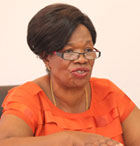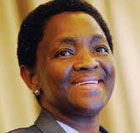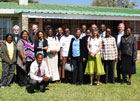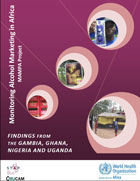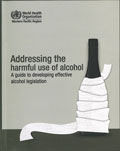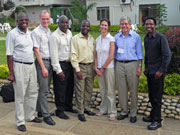Policies, education and mobilization
Despite the enormity of the challenge, evidence and experience strongly suggest that substance use problems can be reduced. Such efforts require the political will to tackle the problems and a smart mix of government policies, education activities, and mobilization of communities and NGOs. Particular attention should focus on implementing evidenced-based strategies, which necessarily include interventions to reduce the availability and the affordability of alcohol and illicit drugs.
Liqour sachets banned in Zambia
The Government of Zambia has with immediate effect banned the manufacturing and sale of strong liquor sachets commonly known as tujilijili. This was announced by Minister Luo (picture)at a press briefing in Lusaka on Sunday 15 April, reports The Times of Zambia.
WHO Bulletin on Global Fund conflict of interest
An article in the Bulletin of the World Health Organization raises concerns regarding conflict of interest in a partnership where SABMiller, the world’s second largest brewer by sales volume, receive funding from the Global Fund for a HIV/AIDS prevention project in drinking establishements in South Africa. "No conflict of interest" replies the Global Fund.
South African Minister of Social Development:
“We have to be robust in reducing harm caused by alcohol"
- We are committed to using evidence-based strategies to reduce the harm caused by alcohol use and abuse. South African Minister of Social Development, Bathabile Dlamini.
Zambia: An alcohol policy alliance in the making?
Zambia needs a stronger NGO voice to promote public health concerns in alcohol policy formulation. This was one of the conclusions in a meeting for civil society organizations in Lusaka on the 10th of June.
New WHO report:
Monitoring Alcohol Marketing in Africa
Effective legislation is necessary to strictly regulate alcohol marketing activities. This is one of the recommendations in a new report; "Monitoring Alcohol Marketing in Africa", released by WHO AFRO today.
WHO Western Pacific Region relases guide:
Developing effective alcohol legislation
Many governments realize the need for effective legislation to reduce the harm from alcohol use. This is also reccommended by the World Health Organization (WHO) Global strategy to reduce the harmful use of alcohol. But how to do it? WHO Western Pacific Regional Office has offered a guide.
Lesotho: Training session held on evidence-based alcohol policies
“Prevention of alcohol problems is a leadership issue for the whole nation. The issue must be brought to the top of our political agenda”, says Lesotho’s Honourable Minister of Tourism, M. Ramaili (picture left). Lesotho’s alcohol policy will now be revised.
Research report from Zambia:
Alcohol advertising works while alcohol education seems to have little effect
Alcohol advertising seeks to influence young people’s drinking habits while alcohol education programs appears not to have the same effect in preventing youth from drinking. This is the key result of a study from Zambia which was published recently.
An alcohol policy alliance for Southern Africa under formation
An initiative to establish a Southern Africa Alcohol Policy Alliance has been taken. An interim board was elected at a meeting in Kampala.
National Conference in Thailand
Alcohol in the Globalized World
- Thailand will never give trade benefits higher priority than public health, declared Thai Prime Minister Abhisit at this year’s National Alcohol Conference in Bangkok.
